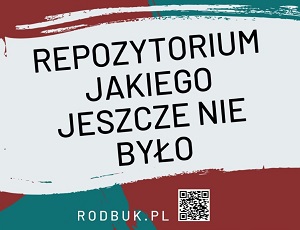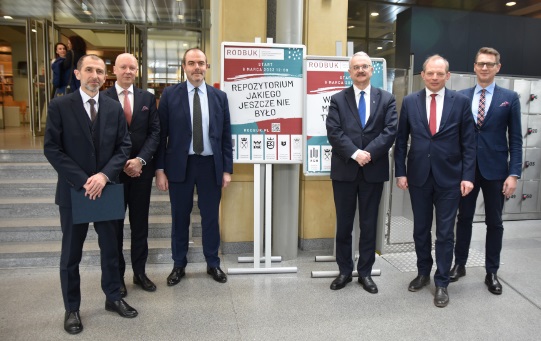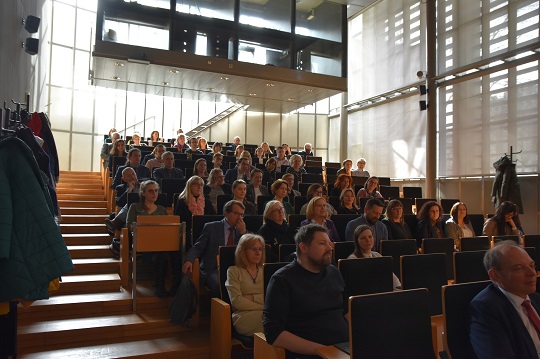
On March 6th, 2023, the Jagiellonian Library hosted an official inauguration of the Open Research Data Repository for Krakow Universities.
Implementing the policy of open science, RODBUK enables scholars, doctoral candidates, and students from various disciplines to deposit, archive, and share data related to their research projects.
It is the first repository in Poland to adopt a distributed operating model. While each of the participating universities runs a separate instance of the system on its own, all the multiple research data resources can be searched by users through a common aggregator: https://rodbuk.pl.
The launch of the Repository was proclaimed by JU Vice Rector for University Development Prof. Jarosław Górniak, JU Vice Rector for Research Prof. Piotr Kuśtrowski, and AGH University Vice Rector for Science Prof. Marek Gorgoń, jointly with Director of the Jagiellonian Library Dr. Remigiusz Sapa, and JL Deputy Director for Digital Resources Dr. Leszek Szafrański.
Present at the ceremony were also representatives of the dean's authorities of JU faculties, Director of the Krakow Library Group and Director of the AGH University Main Library Dr. Stanisław Skórka, directors of JU institutes, members of the KLG RODBUK task team from the participating libraries, heads of JL network libraries, faculty coordinators for scholarly publications, as well as members of JL staff.
In his address, the JL Director emphasised that this is a vital moment for the Jagiellonian Library which strives to be a mainstay of major developments going on within the University.
‘With the onset of «digital» in academic endeavour‘, began the JL Director, ‘our Library embraced it rather promptly. So far we have not only created the JU Repository, where scholarly and didactic achievements are available in open access, along with the bibliography of the JU authors, but also supported evaluation procedures at the University and ministerial levels. Now we take another step forward and officially initiate the Open Research Data Repository RODBUK.’
 The JL Director pointed out that today academic libraries of the best world universities to a large extent deal with research data. This is an indispensable element of research activity of a modern university, which allows not only to fulfil the formal and legal requirements in applying for grants as well as requirements related to data storage, but also prompts a change in the approach to scholarly work, increasingly referred to as ‘data science’.
The JL Director pointed out that today academic libraries of the best world universities to a large extent deal with research data. This is an indispensable element of research activity of a modern university, which allows not only to fulfil the formal and legal requirements in applying for grants as well as requirements related to data storage, but also prompts a change in the approach to scholarly work, increasingly referred to as ‘data science’.
JL Vice-Rector Prof. Jarosław Górniak, who has piloted and supported the entire initiative, emphasised that the idea of a data repository presented by Dr. Stanisław Skórka at the meeting of the KLG Steering Committee was very well received.
‘At all universities’, continued Prof. Górniak, ‘we are faced with the challenge of collecting, processing, and managing research data. I experienced this as the Dean of my Faculty, where disciplines such as psychology had a long standing problem of storing research data and fulfilling the standards of sharing them with the scholarly world at large.’
Prof. Górniak expressed his hope that the use of RODBUK will become widespread among scholars, which requires very efficient communicational and promotional efforts. In consequence, the Repository will provide for safe and professional storage of research data, as well as for presenting to the scholarly community along the principles of ‘open science’.
JU Vice-Rector Prof. Piotr Kuśtrowski presented how open science arose in the world’s most developed countries at the turn of 20th and 21st centuries.
‘The academic community increasingly demanded wide access on the open source basis to the research data’, said Prof. Kuśtrowski, ‘which are created in the effect of research work financed with public funds. The pressure for open science was greatest in the United States. Then followed relevant political and strategic decisions, as well as efforts to convince the entire scholarly community of the need for open science. […] We are just at the beginning of this road, but there is still a problem of changing the mentality of scholars who keep on perceiving research work in a traditional way. '
Prof. Kuśtrowski emphasised that RODBUK is a tool that will facilitate implementation of research projects and fulfilment of obligations imposed by funding institutions such as the National Science Centre or the European Commission.
AGH University Vice Rector for Science Prof. Marek Gorgoń shared his reflection that the own dedicated data repository can considerably enhance recognizability and citability of the Krakow scholarly community.
Dr. Leszek Szafrański, the project’s coordinator, gave a short presentation on the origins and functioning of RODBUK.
 In June 2021, the Board of Directors of the Krakow Library Group appointed a task team which, in cooperation with the Academic Computer Centre Cyfronet AGH, was to develop guidelines for a repository of open research data. The members of the team are the library directors and librarians from six Krakow universities: the AGH University of Science and Technology, University of Physical Education, Cracow University of Technology, Cracow University of Economics, Jagiellonian University, and Pedagogical University.
In June 2021, the Board of Directors of the Krakow Library Group appointed a task team which, in cooperation with the Academic Computer Centre Cyfronet AGH, was to develop guidelines for a repository of open research data. The members of the team are the library directors and librarians from six Krakow universities: the AGH University of Science and Technology, University of Physical Education, Cracow University of Technology, Cracow University of Economics, Jagiellonian University, and Pedagogical University.
The Research Data Team for the Jagiellonian University operating in the Jagiellonian Library consists of the JL Deputy Director for Digital Resources Dr. Leszek Szafrański, and Małgorzata Galik and Joanna Konik from the JL Digital Collections Department. Its mission is to assist the University community in depositing and archiving research data in RODBUK and related matters.
‘We have done a large amount of work and we keep on working’, concluded Dr. Szafrański, ‘since repositories are such ‘creations’ that require tending on end. The next step is to connect RODBUK to the European Open Science Cloud EOSC to promote the Repository on the global scale, which will constitute an added value for all users of the Repository.’

